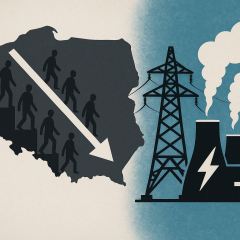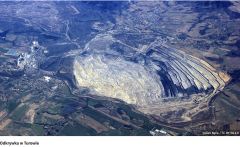Baden-Baden: insurers and reinsurers renew their contracts. Also those causing climate chaos. Unfriend Coal called on Lloyds of London and Talanx not to renew treaty reinsurance for PZU Group in Monte Carlo and we ask them the same now. No new coal insurance and reinsurance!!!
No insurance on a burnt planet: the role of reinsurance companies in the climate emergency
Our planet and the global economy is at risk of catastrophic collapse. To achieve the Paris Agreement goal of keeping global warming to well below 2 degrees, but preferably 1.5 degrees, emissions must be reduced sharply and fast. Making finance flows and services - including insurance and reinsurance — consistent with a pathway towards low greenhouse gas emissions and climate resilient development is one of the three main objectives set by the international community in the 2015 Paris Agreement. But insurance and reinsurance companies are not moving fast enough and all are still, in one way or another, closely linked to fossil fuels.
Coal is still dominant in the power sector, generating 40-41% of the world’s electricity says Carbon Brief and, based on IEA figures, contributing 44% of global energy-related CO2 emissions. In South Africa reportedly over 90% of electricity is generated from coal, higher than anywhere else in the world. In Poland, Europe’s most dependant coal economy, the figure is understood to stand at 83%. In China and India it’s been found to be more than 70%. Although 13 countries have pledged to phase out coal by 2030, the same number is travelling in the opposite direction, planning to join the club of coal power producers.
A coal project cannot exist without insurance and insurance is usually one of a power company’s highest costs. Companies that provide insurance to power plants require coverage themselves, and this is known in the industry as reinsurance. This reinsurance is coverage that an insurance company purchases from another insurance company to partly insulate itself from the risk of a major claim. While a large number of insurance companies exist and populate the market, the reinsurance industry is considerably more concentrated, with just 5 companies writing 50% of premiums, according to the OECD.
Conflicting role?
Insurance and reinsurance is about protection, but that stands in conflict with enabling the coal business and ensuring its continuation. Over the last few years sections of the insurance industry have gradually warmed to the divestment movement, but it is not enough.
According to research by IEEFA from February 2019, 20 globally significant insurers with more than $6 trillion in assets and representing 20% of global insurance assets (which stand at US$30 trillion in aggregate) have adopted coal divestment policies, including the four largest European insurers. When smaller insurers and partial divestments are included, the total is 25 financial institutions globally.
Although the divestment movement campaigns against all fossil fuel projects, reinsurers appear to have focused predominantly on coal. By the middle of 2018, nearly half of the global reinsurance market were reported to have divested some or all of their assets from coal. These seven companies — Hannover Re, Swiss Re, Munich Re, SCOR, Lloyd’s, Generali and the Markel Corporation — are estimated to control 45% of global reinsurance premiums.
Confusing coal criteria
The criteria for what these major carriers will or will not insure not only differ from each other, but also allow for the continued underwriting of certain coal risks, according to insurance and risk firm Willis Towers Watson. For example, when Hannover Re announced its coal divestment decision it said that it will continue to reinsure coal plants and other fossil energy resources, and would not “act contrary to the decisions of sovereign nations” that wish to continue with such projects. And despite the Lloyd’s Corporation implementing a “coal exclusion policy,” individual Lloyd’s syndicates are reportedly free to continue to invest in and insure coal projects.
Although these seven reinsurers will reportedly no longer insure single coal-fired power plants, most will reportedly continue to insure insurance companies that cover power suppliers generating electricity from multiple sources, including coal, provided that the contribution from coal is less than approximately 30% (or similar ceiling). This creates the unusual situation where the insurability of a coal plant could be determined not on its own qualities or environmental impact, but by whether or not it is part of a mixed portfolio with other types of fossil fuel or renewable energy plants.
These seven insurers say the change in their underwriting stances is to reduce CO2 emissions in order to meet the Paris Agreement goal of restricting global warming to no more than 2°C above pre-industrial levels (this was the previously considered manageable increase, before the IPCC report lowered it to 1.5°C). According to Zurich, for example, “Insurers can play a role in facilitating this generational transition towards cleaner energy by increasingly reflecting the climate-related risks inherent in thermal coal in their underwriting and investment policies.” But this appears to be disingenuous.
Following the money
In December 2016 ClimateWise revealed that the frequency of windstorms, floods, and weather-related catastrophes had increased six-fold since the 1950s. A paper on climate change and reinsurance implications by Traub Lieberman Straus & Shrewsberry LLP and Aspen Re from June 2019 describes 2017 as the costliest year on record for natural catastrophe events, with US$344 billion in global economic loss, of which 97 percent was due to weather-related events, while insured loss estimates from natural catastrophes reportedly totaled US$140 billion in 2017. For 2018, Munich Re put overall loss figures related to extreme storms, wildfires and droughts at US$160bn, with half of these losses being insured.
In light of this ecological and economical link, alongside a 2018 IPPC warning of global fiscal losses reaching $69 trillion with 2 degrees Celsius of warming, insurers expected to pay claims arising from such events now have a clear financial incentive.
Growing movement
We have to urgently step up our game and put more pressure on insurers and reinsurers to stop enabling fossil fuels once and for all. The timing of this is especially important as companies are quickly learning how to professionally greenwash themselves to attract and train a growing mass of sceptical, environmentally aware customers.
Customers of the future
The next generation of these customers is in part made up by the growing wave of student climate strikers all around the world. Inspired by Greta Thunberg’s Fridays For Future movement, millions of young people from every corner of the earth are rising up to demand strong climate action from global leaders, including no new fossil fuels from here on in and a phase out of existing ones in line with the 1.5 degree objective. This movement continues to grow, with more than 8 million people, young and old, joining the last wave of global climate strikes at the end of September. Corporations and companies that wise up to this emerging new paradigm will fare better in the economies of the future.
Greenpeace therefore demands that reinsurance companies commit to developing or updating climate strategies. These strategies must include a commitment not to support — through underwriting or investment - the further expansion of fossil fuels. Additionally, in line with the findings of the IPCC special report on 1.5°C, any company not phasing out coal by 2030 in OECD countries and 2040 globally, must be excluded from further activities of any kind - this includes not renewing contracts, when these come to an end.
Published October 22nd 2019
Greenpeace International
SOURCE: https://docs.google.com/document/d/1w8pzWdQLjVobj43Kb8HYFgclKGO8rTgKmqc7Wh_4zXs/edit








